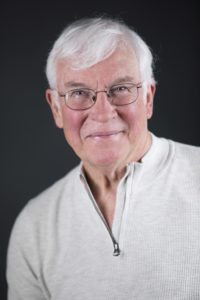 According to the Buddha, the three things that prolong suffering in life are greed, hate, and delusion. In my own experience, these are not that easy to shake. However, the Buddha offers us a way out of this suffering – the Eightfold Path.
According to the Buddha, the three things that prolong suffering in life are greed, hate, and delusion. In my own experience, these are not that easy to shake. However, the Buddha offers us a way out of this suffering – the Eightfold Path.
This hit home for me last night as I watched the movie, Groundhog Day, with my wife and friends. I’ve seen it before, so I was very reluctant to go. I don’t much like going to the movies, especially ones I’ve seen before. But, our good friend, Ditte’s birthday is on February second, and her tradition is to invite friends out for a drink and a bite followed by viewing Goundhog Day on the big screen at the theater in our town – they also have the tradition of playing the movie each year(!). My tradition is to go for the drink and a bite portion and… skip the movie. Last night, as usual, my wife encouraged me to stay. A few years ago, my desire to not waste my time on a silly movie would have won out. But, this time, I made the choice to go with them. My wife was delighted.
Over the last few years, I have made significant conscious changes in myself. Years ago I found myself in despair, pain, and quite a bit of suffering. I was so caught up in my own struggle, I wasn’t even aware I was causing suffering in others – especially my loved ones. I wanted love, yet I was pushing it away. I sought answers. I embraced the Buddha’s eightfold path which included holding that desire to change strongly (Right Intention) and then, doing things to put it into practice daily (Right Action).
As I deepened my self reflection, I became keenly aware that I needed to move beyond knowledge of the teachings and put them into conscious practice. I chose to become more thoughtful and compassionate by practicing small acts of loving kindness. Starting with my wife, I assigned myself the task to do one kind thing for her each day – that she might not even be aware of. Over time, I gained greater awareness of what matters to others and now have the capacity to put their needs ahead of my own more often than not – and, feel good, not resentful, about the choice. This practice has transformed not only my life, but also the lives of those around me.
Back to the movie. Last night, I chose to go, and it was as if I was seeing it for the first time. Perhaps it was the new lens I was seeing the world through. Perhaps it was my choice to be more present. I saw the main character in the movie, Phil, played by Bill Murray, was in an even worse dilemma than I had been in. Early on we see Phil is a somewhat flawed character. He has a disdain for others, is self-centered, and doesn’t seem to value what really matters in life – signs of greed, hate, and delusion.
He then finds himself waking up each day to the same day: Groundhog Day. His suffering grows as he becomes stuck in this perceived purgatory. He tries many ways out including indulgence, cleverness, and suicide. They all fail. But Phil is smart and learns something from each attempt. At some point, he witnesses death. This affects him deeply. A nurse says, “It happens.” and he replies, “Not today.” His world view widens. With this wider awareness he begins to act and do things differently.
 He sees more, becomes more compassionate, and starts to perform many acts of loving kindness – even saving others from harm. As Phil becomes less self absorbed, he also becomes less desperate to escape. Is he overcoming greed, hate, and delusion along the way, perhaps? In the end what he finds is unconditional love. He is loved by many and he loves many. He even wins the love of the woman he had been pursuing unsuccessfully earlier. At the point he is fully loving and being loved he awakens to a new day: the next day! He is no longer stuck. Groundhog Day is over. The end of his suffering. Liberation.
He sees more, becomes more compassionate, and starts to perform many acts of loving kindness – even saving others from harm. As Phil becomes less self absorbed, he also becomes less desperate to escape. Is he overcoming greed, hate, and delusion along the way, perhaps? In the end what he finds is unconditional love. He is loved by many and he loves many. He even wins the love of the woman he had been pursuing unsuccessfully earlier. At the point he is fully loving and being loved he awakens to a new day: the next day! He is no longer stuck. Groundhog Day is over. The end of his suffering. Liberation.
This time, as I watched the movie through my widened world view, I found myself relating it to both my own life and the path of the Buddha, and I became physically and emotionally moved. I saw connections and subtleties that I had not seen before. Of course, the movie was the same – I was the one that had changed. This reinforced my understanding that overcoming suffering results from who we become on the inside through our chosen actions. It’s not achieved by what we believe, manipulate, or cling to. My faith in my own capability and others capacity to transform has been further strengthened. Our daily actions matter and make a difference. And it does not have to be difficult. Even the smallest of acts of loving kindness affect the lives of those around us, and ultimately, our own life and our own state of happiness.
Michael Lee grew up in Australia and held teaching posts there, before leaving for the USA in 1984 to pursue his yoga quest. He wanted to learn about the effectiveness of yoga for changing lives and so began a career in yoga and yoga therapy with a focus on mental and emotional health and spanning 33 years. Michael founded Phoenix Rising Yoga Therapy in 1986 based on his learning and integration of yoga and elements of contemporary psychology. Phoenix Rising now has training programs in several cities in the USA, in Canada, and in Japan and has over 2000 graduates. Michael and his wife Lori parent five adult children live in rural Massachusetts.

